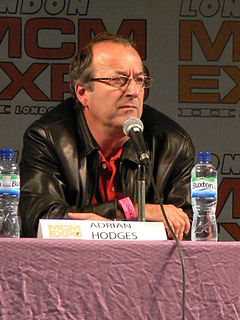A Quote by Adrian Hodges
One of the problems of this genre is that there are cliches everywhere, and you've got to be careful and watch out. Our rule with cliches is to either gently acknowledge them and make fun of them, or do something else. Milady is, in one sense, a villain because she does bad things.
Related Quotes
Beware of clichés. Not just the clichés that Martin Amis is at war with. There are clichés of response as well as expression. There are clichés of observation and of thought - even of conception. Many novels, even quite a few adequately written ones, are clichés of form which conform to clichés of expectation.
I seem to know all the cliches, but not how to put them together in a believable way. Or else these stories are terrible and grandiose precisely because all the cliches intertwine in an unrealistic way and you can't disentangle them. But when you actually live a cliche, it feels brand new, and you are unashamed.
When all the archetypes burst out shamelessly, we plumb the depths of Homeric profundity. Two clichés make us laugh but a hundred clichés moves us because we sense dimly that the clichés are talking among themselves, celebrating a reunion. . . . Just as the extreme of pain meets sensual pleasure, and the extreme of perversion borders on mystical energy, so too the extreme of banality allows us to catch a glimpse of the Sublime.
Villains can often be one note and I would say in that case, it’s not fun to play the villain. It’s fun to play the villain if he a) has dimension and b) the villain gets to do all the things in the movie that in life he would get punished for. In the movie, you’re applauded for them if you do them with panache. And so that’s why it’s more fun to play the villain.




































